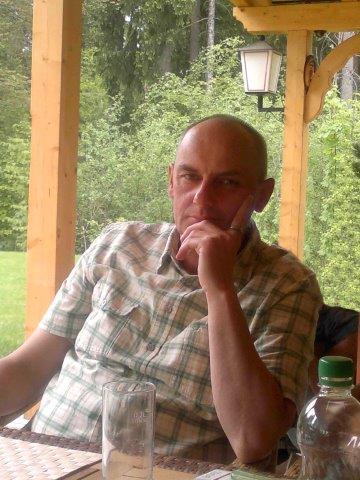Our priests - in memoriam
Our priests - in memoriam

Ladislav Medvešček - Bàbá Lado - Àpèyẹ̀wò, 1946-2016
The literal translation of the name Àpèyẹ̀wò is the following: Something or someone that is visible and noticeable, Someone who commands attention, Someone who cannot be hidden, Something as evident as the Sun and the Moon, the stars, the sky, the rain, and the nature as a whole. In short, the name denotes what is transparent and visible to anyone.
When applying this concept to Mr. Ladislav Medvešček, we must look back at the inception of the Spiritual Community of the Òrìṣà – Energies of Nature in Slovenia because he was actively involved in laying the groundwork. This carries a great spiritual significance first implied by bàbáláwo Fábùnmi during the initiations of the first group of worshippers when Ifá relayed the message that Slovenia is going to play an important role and make a significant contribution in relation to the visibility of the Òrìṣà philosophy in Slovenia and throughout Europe.
Ladislav underwent the initiation as a fully formed spiritual master and teacher with profound skills in other areas. However, despite years of commitment to other branches of spirituality, he humbly accepted and adopted the Òrìṣà philosophy as an additional concept within his vast knowledge. He was humble and spiritually wise enough to accept and adopt Ifá, joining us on several initiation trips to Brazil and Nigeria because his spiritual “purpose” was to become a part of the spiritual base for everyone. His humility and modesty were firmly rooted in profound spirituality. He may be regarded as the godfather of the Spiritual Community of the Òrìṣà – Energies of Nature. Thanks to him and his family, the Community found its very first home. He did everything with total neutrality, without any material or other interests, without ego, without any desire for self-promotion, and without a shred of selfish ambition.
Following his death, the divination suggested the use of the name Àpèyẹ̀wò as a way of honouring his ancestral role that truly deserves to be recognized. The divination was performed in order to verify his willingness to accept this posthumous role as it cannot be imposed on anyone. In terms of Egúngún, our wishes had to be verified and confirmed. In this particular instance, his Ọmọlú Burùkú quality with the exact same meaning is a spiritual coincidence that manifested itself upon the initiation. As the same characteristic is present in the Egúngún cult as a separate quality, it was one of the options for verification that actually provided a confirmation, amounting to a very fascinating coincidence.
Based on his spiritual history, the name was accepted and verified through the process of divination and ultimately accepted by his Orí, his soul.
My personal observation as to why he was so enthusiastically accepted as one of the venerable ancestors is based on the spiritual aspect of his personal history, which reveals that after several years of committing himself to spirituality and working with people, he was preserved in people’s memories for his modesty and humility that earned him social acclaim, acceptance, and applause. Indirectly and unknowingly, he was working to achieve this recognition all his life.
Bàbá King, June 2021

Iztok Mulec - Ògún Omídélé, 1965-2015
Iztok spent his childhood and youth in Kamnik – the town that is inextricably linked to the Southern Alps and whose inhabitants live as one with the mountains. Iztok loved them too. Throughout his life, the hills and mountains of Kamnik were the refuge he sought whenever he needed peace and quiet, which he craved constantly as he was a highly spiritual person. Those were the final years of Yugoslavia, the most controversial period of his generation. He was always intrigued by the great mystery but lacked sufficient backing in his environment, primarily because the times of socialism were not supportive of such inquisitive pursuits. He read all the literature on fringe knowledge that he could get hold of at the time.
In 1991, he heard about Ladislav Medvešček – Adi, who made a great impression on Iztok. He introduced him to the elementary spiritual secrets and borrowed him the first spiritual books. Adi became Iztok’s earliest spiritual mentor and taught him his techniques. They discovered new approaches together and shared knowledge and experiences. Iztok became Adi’s assistant in performing various techniques and soon rose to the level of absolute mastery himself. It is impossible to list all of his activities during this period.
In February 2003, he travelled to Brazil, where Slovenians first came into contact with Ifá spirituality. The high priest of Ifá, bàbáláwo Fábùnmi Ṣówùnmí, performed his initiation into the Ifá mystery, and Ifá subsequently became his primary activity. He was regularly initiated into other Òrìṣà, and in 2006, he completed his education as a member of the first group of students in Slovenia, thus becoming an Ifá priest. During this period, he also mastered the process of the divination with 16 cowries. He found his mission in sharing the wisdom through the Òrìṣà Ògún and Akóògún, and he organized the very first ọ̀sẹ́ dedicated to these two Òrìṣà on our territory. Following the recognition of Slovenian venerable ancestors, he helped organize the first gatherings in their honour. When Bàbá King first visited Slovenia, Iztok served as the pillar of practical logistics. He always found the time, provided the necessary equipment and vehicles, and he was always available. As a true manifestation of Ògún, he worked quietly and with utter generosity. Those were also the times when the groundwork for the Spiritual Community was being laid, and everything had to be done from scratch. Without Iztok, it would be hard.
He liked going to the mountains until his very last days, preferably alone, in order to commune with his own mystery. He received the taboo never to reveal it. He is buried in Kamnik, at the cemetery with a view of the mountains.
Sun re o.
Edo Ògúndélé, November 2021